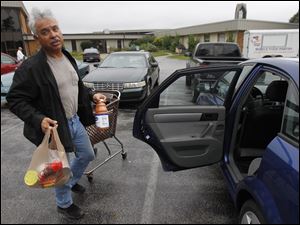
Man’s plight illustrates depth of area’s problems
Local economy in decline years before recession
10/31/2011
David Estrada returns to his car after receiving groceries from the Food for Thought pantry in Oregon. He started going to the pantry more than a year ago.
David Estrada spent years working his way up, literally and figuratively.
He was a maintenance man at Mercy St. Vincent Medical Center for 18 years. Then he got into window installation. Then he became an ironworker.
By 2007, he was working on the Veterans’ Glass City Skyway bridge, hundreds of feet above the ground, a job that cost him a finger. Despite the injury, he was back at work eight days later. At $25 an hour, the pay was too good to miss.
But those jobs are few and far between — and it’s been that way for a long time in Toledo.
Although the bridge job was great, there were signs of trouble long before, said Mr. Estrada, 57, of Oregon. For a stretch of time in 2003, he had to “boom out” — that is, go out of town for work.
Although the recession accelerated the decline, Mr. Estrada’s experience highlights that its impact has been so deep here in large part because Toledo’s economy had been struggling for years, never having recovered from the manufacturing losses of the previous decades.
READ MORE: Desperate times seize area suburbs
That compounding effect is what has made the most recent recession far tougher on Toledo than those of the early ‘80s, ‘90s, and ‘00s, said David Rogers, president and chief executive officer of Cherry Street Missions.
“This whole region never recovered,” he said. “We did not see a return of economic development that the rest of the country did. We never had the opportunity to rebound.”
Mr. Estrada has experienced the effects firsthand. After the bridge project, “things started to go slow,” he said. “In 2008, they came to a halt.”
The past three years, he’s taken an occasional out-of-town job, but even those are tough to land these days, he said. “Right now, I got a call to go to Pittsburgh,” he said. But many employers aren’t even willing to pay a per diem because of the ready availability of workers, Mr. Estrada said. Gas, food, and lodging quickly eat away at profits.
That’s why, on a recent afternoon, he waited with 15 others at Food for Thought, an Oregon food pantry. He started coming a year and a half ago, never imagining he’d still be coming today.
The pantry’s director, Sam Melden, called the length and depth of this particular economic crisis “alarming.”
“It’s not simply the generational poor,” he said. “This is a circumstantial thing.”